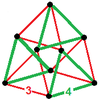Birectified 16-cell honeycomb
| Birectified 16-cell honeycomb | |
|---|---|
| (No image) | |
| Type | Uniform honeycomb |
| Schläfli symbol | t2{3,3,4,3} |
| Coxeter-Dynkin diagram | |
| 4-face type | Rectified tesseract Rectified 24-cell |
| Cell type | Cube Cuboctahedron Tetrahedron |
| Face type | {3}, {4} |
| Vertex figure |  {3}×{3} duoprism |
| Coxeter group | = [3,3,4,3] = [4,3,31,1] = [31,1,1,1] |
| Dual | ? |
| Properties | vertex-transitive |
In four-dimensional Euclidean geometry, the birectified 16-cell honeycomb (or runcic tesseractic honeycomb) is a uniform space-filling tessellation (or honeycomb) in Euclidean 4-space.
Symmetry constructions
There are 3 different symmetry constructions, all with 3-3 duoprism vertex figures. The symmetry doubles on in three possible ways, while contains the highest symmetry.
| Affine Coxeter group | [3,3,4,3] |
[4,3,31,1] |
[31,1,1,1] |
|---|---|---|---|
| Coxeter diagram | |||
| Vertex figure |  |
 |

|
| Vertex figure symmetry |
[3,2,3] (order 36) |
[3,2] (order 12) |
[3] (order 6) |
| 4-faces | |||
| Cells |
Related honeycombs
The [3,4,3,3], ![]()
![]()
![]()
![]()
![]()
![]()
![]()
![]()
![]() , Coxeter group generates 31 permutations of uniform tessellations, 28 are unique in this family and ten are shared in the [4,3,3,4] and [4,3,31,1] families. The alternation (13) is also repeated in other families.
, Coxeter group generates 31 permutations of uniform tessellations, 28 are unique in this family and ten are shared in the [4,3,3,4] and [4,3,31,1] families. The alternation (13) is also repeated in other families.
| F4 honeycombs | |||
|---|---|---|---|
| Extended symmetry |
Extended diagram |
Order | Honeycombs |
| [3,3,4,3] | ×1 | ||
| [3,4,3,3] | ×1 |
| |
| [(3,3)[3,3,4,3*]] =[(3,3)[31,1,1,1]] =[3,4,3,3] |
= = |
×4 | |
The [4,3,31,1], ![]()
![]()
![]()
![]()
![]()
![]()
![]() , Coxeter group generates 31 permutations of uniform tessellations, 23 with distinct symmetry and 4 with distinct geometry. There are two alternated forms: the alternations (19) and (24) have the same geometry as the 16-cell honeycomb and snub 24-cell honeycomb respectively.
, Coxeter group generates 31 permutations of uniform tessellations, 23 with distinct symmetry and 4 with distinct geometry. There are two alternated forms: the alternations (19) and (24) have the same geometry as the 16-cell honeycomb and snub 24-cell honeycomb respectively.
| B4 honeycombs | ||||
|---|---|---|---|---|
| Extended symmetry |
Extended diagram |
Order | Honeycombs | |
| [4,3,31,1]: | ×1 | |||
| <[4,3,31,1]>: ↔[4,3,3,4] |
↔ |
×2 | ||
| [3[1+,4,3,31,1]] ↔ [3[3,31,1,1]] ↔ [3,3,4,3] |
↔ ↔ |
×3 | ||
| [(3,3)[1+,4,3,31,1]] ↔ [(3,3)[31,1,1,1]] ↔ [3,4,3,3] |
↔ ↔ |
×12 | ||
There are ten uniform honeycombs constructed by the Coxeter group, all repeated in other families by extended symmetry, seen in the graph symmetry of rings in the Coxeter–Dynkin diagrams. The 10th is constructed as an alternation. As subgroups in Coxeter notation: [3,4,(3,3)*] (index 24), [3,3,4,3*] (index 6), [1+,4,3,3,4,1+] (index 4), [31,1,3,4,1+] (index 2) are all isomorphic to [31,1,1,1].
The ten permutations are listed with its highest extended symmetry relation:
| D4 honeycombs | |||
|---|---|---|---|
| Extended symmetry |
Extended diagram |
Extended group |
Honeycombs |
| [31,1,1,1] | (none) | ||
| <[31,1,1,1]> ↔ [31,1,3,4] |
↔ |
×2 = | (none) |
| <2[1,131,1]> ↔ [4,3,3,4] |
↔ |
×4 = | |
| [3[3,31,1,1]] ↔ [3,3,4,3] |
↔ |
×6 = | |
| [4[1,131,1]] ↔ [[4,3,3,4]] |
↔ |
×8 = ×2 | |
| [(3,3)[31,1,1,1]] ↔ [3,4,3,3] |
↔ |
×24 = | |
| [(3,3)[31,1,1,1]]+ ↔ [3+,4,3,3] |
↔ |
½×24 = ½ | |
See also
Regular and uniform honeycombs in 4-space:
- Tesseractic honeycomb
- 16-cell honeycomb
- 24-cell honeycomb
- Rectified 24-cell honeycomb
- Truncated 24-cell honeycomb
- Snub 24-cell honeycomb
- 5-cell honeycomb
- Truncated 5-cell honeycomb
- Omnitruncated 5-cell honeycomb
Notes
References
- Kaleidoscopes: Selected Writings of H.S.M. Coxeter, edited by F. Arthur Sherk, Peter McMullen, Anthony C. Thompson, Asia Ivic Weiss, Wiley-Interscience Publication, 1995, ISBN 978-0-471-01003-6 [1]
- (Paper 24) H.S.M. Coxeter, Regular and Semi-Regular Polytopes III, [Math. Zeit. 200 (1988) 3-45]
- George Olshevsky, Uniform Panoploid Tetracombs, Manuscript (2006) (Complete list of 11 convex uniform tilings, 28 convex uniform honeycombs, and 143 convex uniform tetracombs)
- Klitzing, Richard. "4D Euclidean tesselations". x3o3x *b3x *b3o, x3o3o *b3x4o, o3o3x4o3o - bricot - O106
| Space | Family | / / | ||||
|---|---|---|---|---|---|---|
| E2 | Uniform tiling | 0[3] | δ3 | hδ3 | qδ3 | Hexagonal |
| E3 | Uniform convex honeycomb | 0[4] | δ4 | hδ4 | qδ4 | |
| E4 | Uniform 4-honeycomb | 0[5] | δ5 | hδ5 | qδ5 | 24-cell honeycomb |
| E5 | Uniform 5-honeycomb | 0[6] | δ6 | hδ6 | qδ6 | |
| E6 | Uniform 6-honeycomb | 0[7] | δ7 | hδ7 | qδ7 | 222 |
| E7 | Uniform 7-honeycomb | 0[8] | δ8 | hδ8 | qδ8 | 133 • 331 |
| E8 | Uniform 8-honeycomb | 0[9] | δ9 | hδ9 | qδ9 | 152 • 251 • 521 |
| E9 | Uniform 9-honeycomb | 0[10] | δ10 | hδ10 | qδ10 | |
| E10 | Uniform 10-honeycomb | 0[11] | δ11 | hδ11 | qδ11 | |
| En-1 | Uniform (n-1)-honeycomb | 0[n] | δn | hδn | qδn | 1k2 • 2k1 • k21 |










